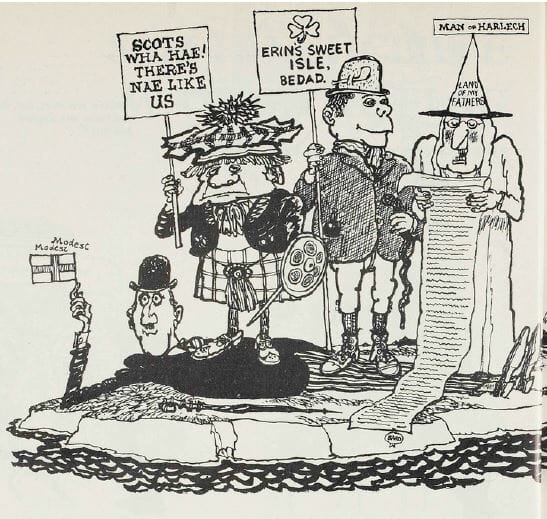Dorothy L. Sayers (1893-1957) is probably best remembered for her gripping crime novels, and her creation of the much-loved, aristocratic detective Lord Peter Wimsey. It is perhaps less commonly known that, beyond her carefully-woven fictional tales, Sayers also possessed a keen interest in politics and current affairs. In August 1940, it was this interest that prompted Sayers to deliver a speech at Chatham House, the Royal Institute of International Affairs, in London.
Sayers’ speech was entitled The Mysterious English, and the 15-page transcript has been digitised as part of the Chatham House Online Archive .1 As one would expect, the oration is full of Sayers’ characteristic wit and humour, and the document offers a unique insight into the author’s attitudes and opinions.

Sayers opens by declaring her intention to describe, and ‘praise’, the English character. Sayers admits that hers is a ‘perilous undertaking’, since ‘English hearers’ will consider such self-praise in ‘very bad taste’ indeed. Sayers claims that, for foreigners, ‘the English are utterly and impenetrably mysterious’, and jokes that, even Americans, who have ‘the advantage of having started life as Englishmen, usually misunderstand us with that extra thoroughness that waits on family misunderstandings’. Luckily Sayers intends to help her listeners to ‘peg down the elusive creature’ of the Englishman.

Sayers argues that the key to an Englishman’s psyche is a, seemingly contradictory, juxtaposition between deep-held patriotism, and a strong disregard for ‘racial purity’. Sayers declares that, ‘if ever you hear a man boast of his pure English blood, he may be a Bostonian…but whatever he is, he is not English’. For Sayers, the history of Englishness is a history of conquest, invasion, migration, appropriation, and change, reflected by the ever-evolving English language. Consequently, Sayers diagnoses the English with a natural squeamishness towards notions of “pure” nationality or “Englishness”. Indeed, the English ‘consider claims to purity of blood…rather childish and absurd’. Instead the Englishman ‘is a magpie of other men’s customs. He will let his native Yule-log fall into disuse, while he picks up and appropriates Christmas Trees from Germany’.
Unlike many other nations, the English are ‘also quite extraordinarily ready to criticise themselves; indeed they spend most of their time doing it’.

The Mysterious English speech was delivered in the summer of 1940, a year after Britain had declared war on Germany. Thus, Sayers’ humorous observations on English national character, also have a much more serious message. In her speech, Sayers is deliberately contrasting the Englishman’s natural distrust of notions of “racial purity”, with the dangerous, supremacist rhetoric of Adolf Hitler and the Nazi party. Reading Sayers’ speech today – as far Right parties continue to increase in popularity across Europe, and millions of refugees from foreign nations desperately need our help – I only hope that Sayers’ optimistic depiction of the English character will still hold true.
To read many more speeches by other great writers and thinkers, check out Gale’s Chatham House Online Archive.

